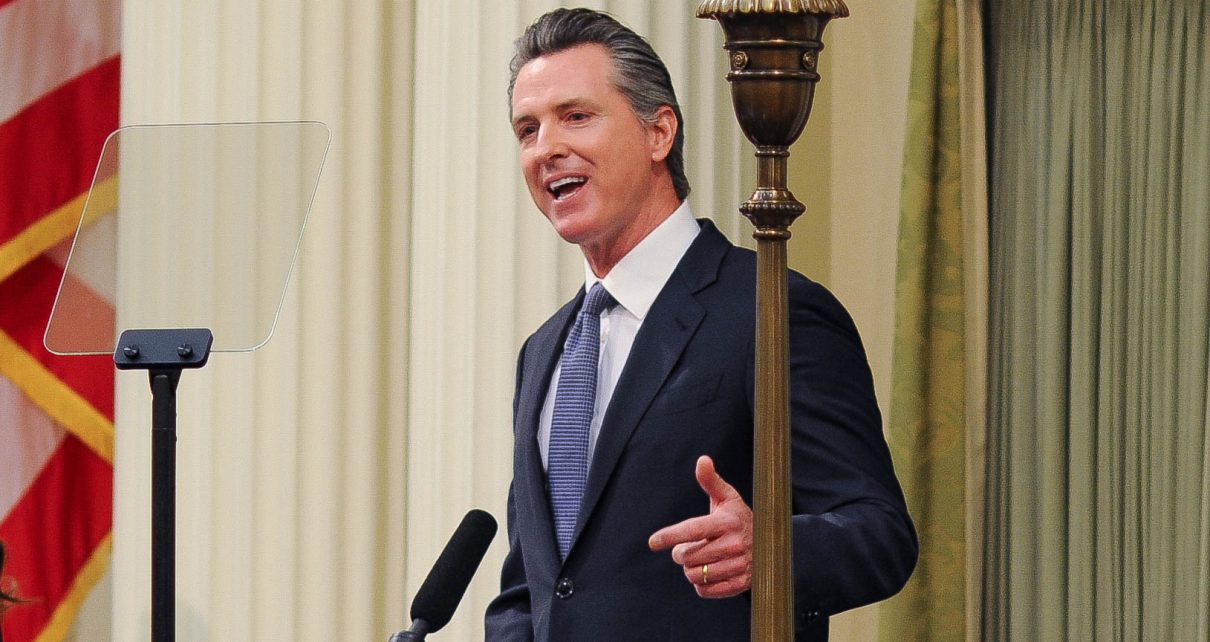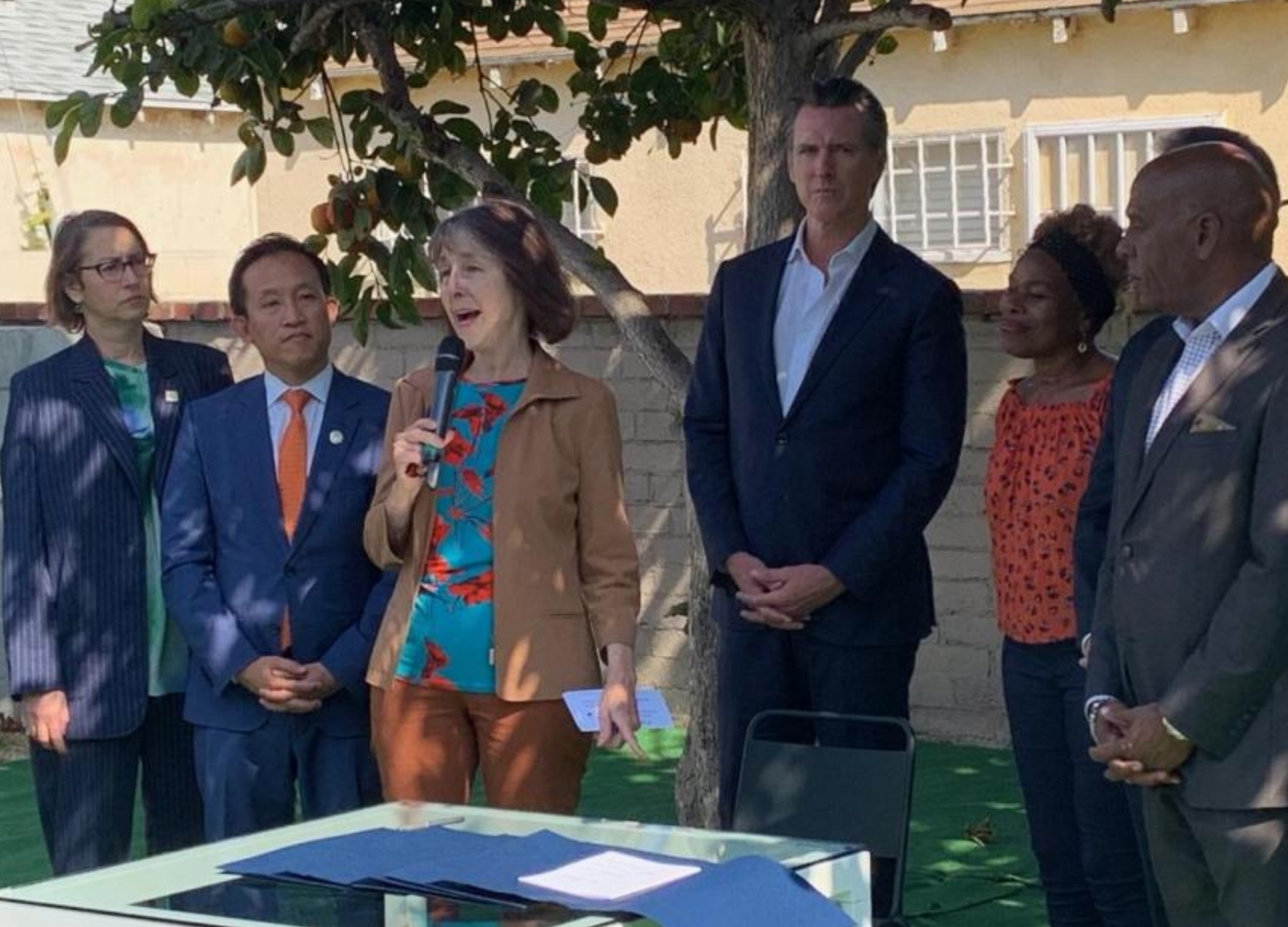
Governor Gavin Newsom (Photo: Kevin Sanders for California Globe)
Governor Newsom Signs 4 Bills Designed To Boost Housing Numbers
‘These bills did not stop NIMBY cities; if anything, it strengthened them today’
By Evan Symon, September 17, 2021 2:11 am
Governor Gavin Newsom signed several bills on Thursday designed to increase housing, speed up the process to approve multi-family housing, and to alter the approval process for new housing.
In total, Newsom signed the following 4 bills:
Senate Bill 8 – Authored by Senator Nancy Skinner (D-Berkeley) – Extends the Housing Crisis Act of 2019 for more housing production. SB 8 also drastically limits relocation benefits for residents from units whose buildings are being demolished or vacated in certain districts. Numerous building exemptions are also given in favor of lower-cost housing units.
Senate Bill 9 – Authored by Senator Toni Atkins (D-San Diego) – Makes it easier for large lots to be split for new housing, including being exempt from California Environmental Quality Act (CEQA) and California Coastal Act hearings, as well as more easily conforming to local zoning laws.
Senate Bill 10 – Authored by Senator Scott Wiener (D-San Francisco) – Will allow multiple unit housing to be placed on single-family and other zoned areas without CEQA approval as long as they are near transit or high traffic areas. Not all land would be covered under the bill for development, with the bill specifically prohibiting development on publicly owned land or re-designated publicly owned land for park or recreational purposes.
Assembly Bill 1174 – (Authored by Assemblyman Tim Grayson (D-Concord) – Makes changes to the existing streamlined, ministerial approval process for housing development in jurisdictions that have not yet made enough progress towards their allocation of their regional housing needs, especially with permit applications.
Support for, Opposition against the housing bills
Support for and opposition against the housing bills varied wildly. While AB 1174 had unanimous support for it, SB 8,9, and 10 had Republicans and Democrats both joining each other in favor and against the bills, being bipartisan on both sides. In the end, the greater need for affordable housing and the reduced number of regulations won most lawmakers over, including Governor Newsom who ultimately passed the bill.

“The housing affordability crisis is undermining the California Dream for families across the state, and threatens our long-term growth and prosperity,” said Governor Newsom in a statement on Thursday. “Making a meaningful impact on this crisis will take bold investments, strong collaboration across sectors and political courage from our leaders and communities to do the right thing and build housing for all.”
While each author celebrated their bill being passed, Senator Wiener was perhaps most excited due to trying to pass his bill for the last several years, including last years controversial, and ultimately failed, SB 50. While SB 10 was an extremely watered down version of SB 50 to appease both Democratic and Republican opponents, he still chalked it up as a win on Thursday.
“California’s severe housing shortage is badly damaging our state, and we need many approaches to tackle it,” noted Senator Wiener on Thursday. “SB 10 provides one important approach: making it dramatically easier and faster for cities to zone for more housing. It shouldn’t take five or 10 years for cities to re-zone, and SB 10 gives cities a powerful new tool to get the job done quickly. I want to thank the Governor for signing this essential bill and for continuing to lead on housing.”
Gov. @GavinNewsom just signed our housing legislation — #SB10 — to make it much easier/faster for cities to zone for small multi-unit homes.
SB 10 streamlines the process for cities to re-zone for density in non-sprawl areas.
Big step in our fight for housing.
Thx, Governor!
— Senator Scott Wiener (@Scott_Wiener) September 16, 2021
Groups in favor of more housing also noted their approval of all the passed bills, including many YIMBY groups who had been pushing for more housing legislation since the housing crisis first began to become apparent last decade.
“Governor Newsom came into office with a strong commitment to ending California’s housing shortage and affordability crisis, and with his signature on this package of bills today, he has made major progress toward honoring that commitment,” said Brian Hanlon, CEO of California YIMBY. “The end of exclusionary, single-unit zoning in California is a historic moment — we’ve taken a huge step toward making California a more affordable, equitable, and inclusive state.”
However, while largely seen as positive, many warned that the bills could have several negative factors and that developers and cities could easily skirt around the new laws and keep large parts of their cities firmly single-family.
New bills may not have as large an impact as supports say they will
“It looks like a sweeping change, but if you know California, it really isn’t,” explained Martin Schules, a housing and mixed-use developer who left California two years ago to focus on developments in Nevada, Arizona, and New Mexico. “CEQA is down for a lot of these projects, which is a good start, but the real trouble are local laws. Los Angeles alone has a ton of local laws that really makes it hard to build affordable multi-family developments. Laws on the books require parking spots, common space, and green space. Even if you build parking underground, which is very expensive, you still have a lot of wasted development space. This bill does nothing to address those.”
“Basically the state legislature is putting in all of these laws aiming to be more public transit friendly, but local laws keep allowing for cars. The state legislature is thinking like New York City and is assuming everyone wants to take the metro or bus or other service like that, but aren’t even looking at the laws that require parking, that encourage cars, and other similar factors. So it just makes the entire situation more messy. No one is coordinating on this.”
“It’s why the only things being built have been higher end apartments. It’s because it’s the only way developers could make back their money with all of those local regulations in place. Even with these new laws, developers lose money with most lower-cost unit focused developments.”
“What we’re are going to see are single family lot owners and homeowners grow more bold and try and declare more places historical,” Schules said. “This is something they mentioned in the bills as being exempted, but really cities have known about this for decades to discourage new developments. Every wonder why Californian cities have so many protected historical districts, have so many individual houses and districts on protected lists, and have so many town hall debates over the historical status of properties? It isn’t all about preservation and history. If your home is protected, it’s safe from redevelopment.”
“There have been a lot of arguments over preserving two story business flats from the 70’s, and architectural dead age, just to stop developments. At the very least, historical reasons can delay projects for years. If you have gone to any city council meeting in a larger city in the last few years, you have likely seen at least a few of these come up, especially on historical status. These bills just made building new developments 100% worse because of the historical building exemptions and the loopholes for them remaining in place. It’s pushing any low-cost, multifamily housing to either in poorer areas of the city near mass transit lines, which Wiener wanted anyway, or makes it even easier to not have low-cost housing in the city as much. Anything built in the strong NIMBY cities will be mostly high-income units with a few affordable thrown in to appease the city government and local laws.”
“These bills did not stop NIMBY cities. If anything, it strengthened them today.”
Other bills awaiting approval by the Governor are expected to be decided on soon.
- Bill to Require Law Enforcement Disclosure if AI Was Used To Help Write Reports - August 7, 2025
- Gov. Newsom Files FOIA Request To ‘Expose True Cost’ Of L.A. Federal Troop Deployment for Anti-ICE Riots - August 6, 2025
- California Redistricting: How Newsom’s Plan Will Demolish Hard Fought GOP Gains - August 6, 2025





Little boxes on the hillside,
Little boxes made of ticky tacky,
Little boxes on the hillside,
Little boxes all the same.
There’s a green one and a pink one
And a blue one and a yellow one,
And they’re all made out of ticky tacky
And they all look just the same.
Malvina Reynolds, 1962
^^^ DICK HEAD or DICK HOARD??? – GO AWAY DICK – your spam is not wanted here….